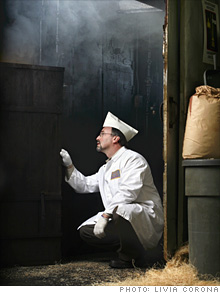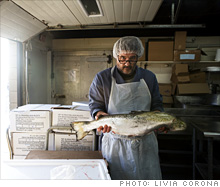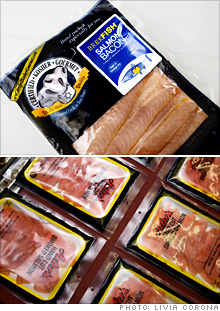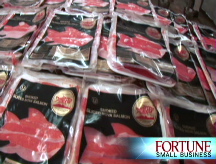Saving a kosher fish biz from extinction
As its clientele ages, Springfield Smoked Fish is trying to reinvent its business for modern consumers.
 |
| Brekfish: The kosher answer to bacon? |
 |
| Alan Axler, vice president of Springfield Smoked Fish. The company has 9 employees and $536,000 in sales last year. |
 |
| Employee Edward Belanger with a fish awaiting the smoker. |
 |
| Fish story: Varied packaging creates consumer confusion. |
SPRINGFIELD, MASS. (FSB Magazine) -- In search of lox, gefilte fish and other traditional delicacies, generations of New England Jews have patronized Springfield Smoked Fish. Founded in 1934 in Springfield, Mass., the company produces more than three dozen fish products using recipes its founders brought from Eastern Europe. Certified kosher, the business follows strict rules in processing its herring, salmon, trout and mackerel. Should the fire go out in the smokehouse oven, for instance, only a rabbi is permitted to relight the flame.
But the spark is dimming in the old fish factory. Springfield Smoked Fish racked up $536,189 in 2008 sales, down 20% from 2000. Many of the company's most loyal customers - the region's older Jews - are entertaining less lavishly these days or retiring to Florida. Meanwhile, their children and grandchildren haven't developed a taste for the seafood dishes so beloved by their elders. While the market for kosher foods is growing modestly in the U.S., fueled less by religious conviction than by consumer concerns about health and food safety, many of the nation's small kosher fish producers are quietly closing their doors or selling out to big food conglomerates.
"We're surviving," Alan Axler, vice president of Springfield Smoked Fish, says wearily, "but barely."
Axler, 48, runs the company with the help of nine employees. His parents, Roberta and Bobby, are no longer involved in the day-to-day operation of the business, although they retain the titles of president and treasurer, respectively.
In an attempt to boost growth, Axler invested thousands of dollars and months of effort in 2007 to develop a new product, a bacon substitute he calls Brekfish. Made of smoked salmon, the product has the savory taste and crunchy texture of crisp, maple-cured bacon, but it is cheaper and less fatty. In taste tests at several local supermarkets, shoppers gobbled up samples, but stores have been reluctant to stock the product. One reason: Axler can't afford the big-budget advertising campaign that retailers request before putting the product on already-crowded supermarket shelves. As a result, sales have been disappointing.
"We thought it would save the company," Axler says. "Now I'm not so sure."
To help Axler revive the family-owned operation, Fortune Small Business recruited three experts to offer him their best advice. For his part, Axler reeled in two friends to participate in the Makeover: Jay Caron, 48, a trucking-equipment salesman; and Gary Goodman, 48, a dentist. The three have been close friends since grade school. Hooked by the potential of Brekfish, Caron and Goodman recently invested in the product.
On a brisk fall day the buddies gather in Springfield Smoked Fish's tiny offices, tucked away at the end of a dead-end street in a working-class neighborhood.
The first expert to join them is Victoria Nessen Kohlasch, 41, chief executive of Nessen Kohlasch & Associates, a marketing consultancy in Lexington, Mass. Axler briefly summarizes the company's woes while phones jangle insistently in the background and his secretary slips him notes.
"Alan," Kohlasch says with great sympathy, glancing around his office, "I think you do just about everything around here."
Caron interrupts: "No one works harder than Alan. He handles production, marketing, distribution, shipping..."
"But you've got one big hole here," Kohlasch continues. "You need someone whose only job is to sell fish."
Her advice: Axler must act boldly to save the family business. Job No. 1 is to boost sales of the company's top-selling products in markets where it has strong brand recognition, namely delis and small specialty supermarkets in the Northeast.
"Even though you've been in business since 1934," she says, "you've got to hammer the market every single day."
Recruit an energetic salesperson who won't be distracted by shipping snafus, cash flow decisions or other management minutiae, she says. Goodman, the dentist, brightens: "My wife is a great salesperson! She really believes in this company."
Although Axler's budget is tight, Kohlasch insists that he update his packaging and marketing materials, which are a jumble of styles and colors, some of them dating to the 1950s. "Well, I hate to waste good paper," he says, chagrined. "I've got boxes of this stuff in the storeroom."
"But the message you are sending the market is confusing," Kohlasch says gently. Like a blackjack dealer, she lays out a fan of labels, catalogues, letterhead and other printed materials on the floor in front of the group. Her message sinks in as everyone looks over the display silently.
"There's too much chatter," Kohlasch says. "Give consumers a single, strong branding message or they will tune you out." Invest in a classic logo that reinforces a message of tradition and quality, she suggests. Then capitalize on health and food trends with stickers affixed to packages, such as ones reading, "High in omega-3!" or "Lowers cholesterol!"
As for Brekfish, Kohlasch urges Axler to set aside his ambitious dreams of placing the product on supermarket shelves across the U.S.
"Realistically, you don't have the resources to make that happen," she says. Persuading consumers to buy kosher "bacon" would be a challenge for even the most talented marketing team. And the trio doesn't have the time or money to dole out samples for millions of supermarket shoppers. As for their hopes that a big-name food manufacturer will pluck the product from obscurity and launch it nationally? "Pretty unlikely," Kohlasch says.
What Springfield Smoked Fish can do is gradually build a Brekfish following in delis, where the company has a long-established reputation for quality. Another Kohlasch suggestion: Give harried deli managers some catchy new ways to use the bacon substitute every week. "How about a healthy BLT?" Kohlasch asks. "If that were the lunch special at my deli, I'd really go for it."
Up next is Alex Langshur, 46, a Web strategist and president of PublicInsite, a consultancy in Medford, Mass. In the days before the Makeover, Langshur ran a series of tests to gauge Springfield Smoked Fish's Internet visibility. One surprising finding: The company places third out of 729,000 listings in a Google search for "smoked fish" - without having spent a dime on search-engine optimization.
"That's huge," Langshur says excitedly. "Freaking huge!"
Still, Springfield Smoked Fish has committed some major online blunders. Langshur did a second Google (GOOG, Fortune 500) search, this time for "smoked salmon," which is the bestselling product in the category. The Springfield Smoked Fish Web site wasn't even in the top 50.
"I know there's a huge demand for smoked salmon on the Internet," Langshur notes, pointing to a long list of other smoked-fish companies plying their wares. "Your competitors have found it."
Axler's site commits several other retail sins. "You make it difficult for me to buy," Langshur says.
Shoppers have to scroll through a lot of text about the company before finding a button that allows them to buy smoked fish. The fish photos are unappealing. The product descriptions are perfunctory and bland. A fuzzy, outdated snapshot of Axler and his father appears for no good reason. Nowhere on the site does the company offer the kind of detailed information that would win the hearts - and business - of serious foodies. For example, Axler should highlight that unlike many of his competitors, he doesn't use liquid smoke, a seasoning, to preserve his fish because he believes that actual smoking, though costlier, imparts a better flavor.
Fortunately, Axler's Website woes are cheaply and easily cured. First, Langshur says, Axler should immediately buy keywords for smoked salmon, whitefish, lox and other fish products. Second, he should create an attractive page with quality photos of gift baskets that urge online shoppers to "buy now."
-
The Cheesecake Factory created smaller portions to survive the downturn. Play
-
A breeder of award-winning marijuana seeds is following the money and heading to the U.S. More
-
Most small businesses die within five years, but Amish businesses have a survival rate north of 90%. More
-
The 10 most popular franchise brands over the past decade -- and their failure rates. More
-
These firms are the last left in America making iconic products now in their twilight. More









